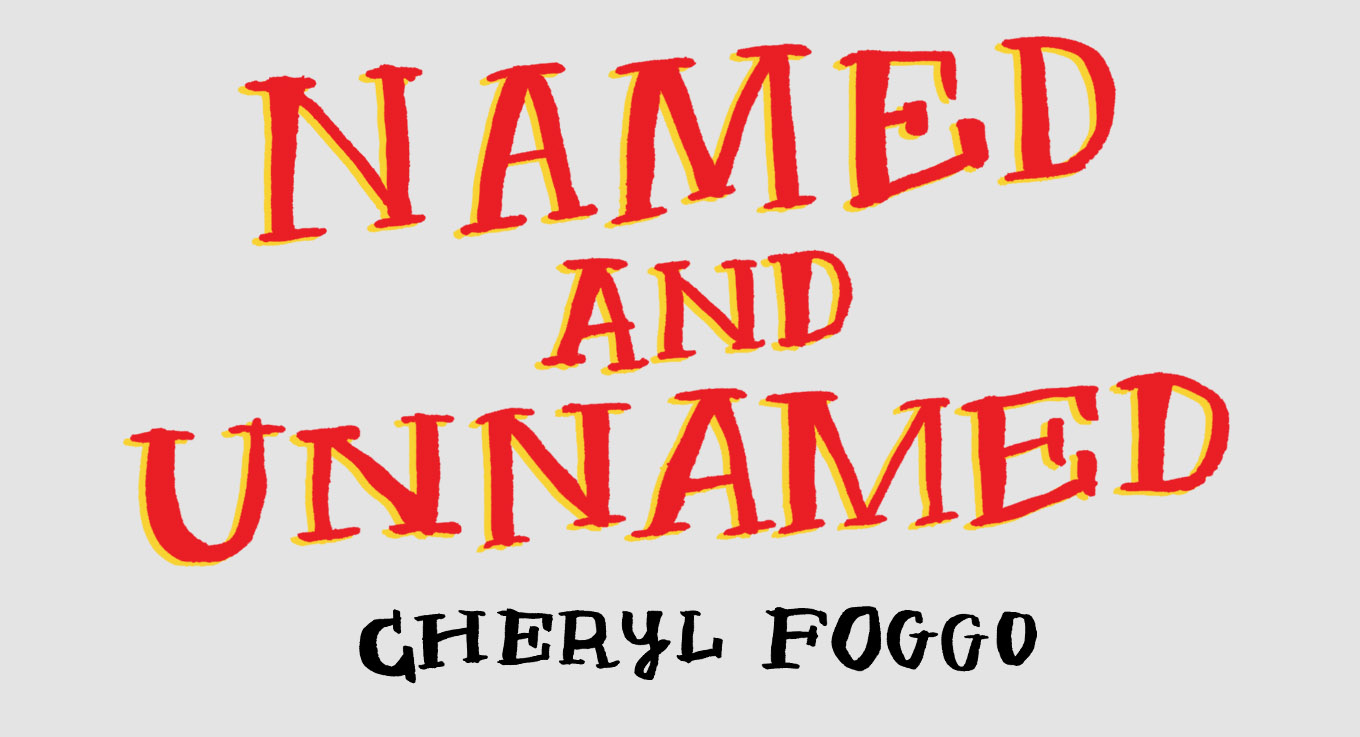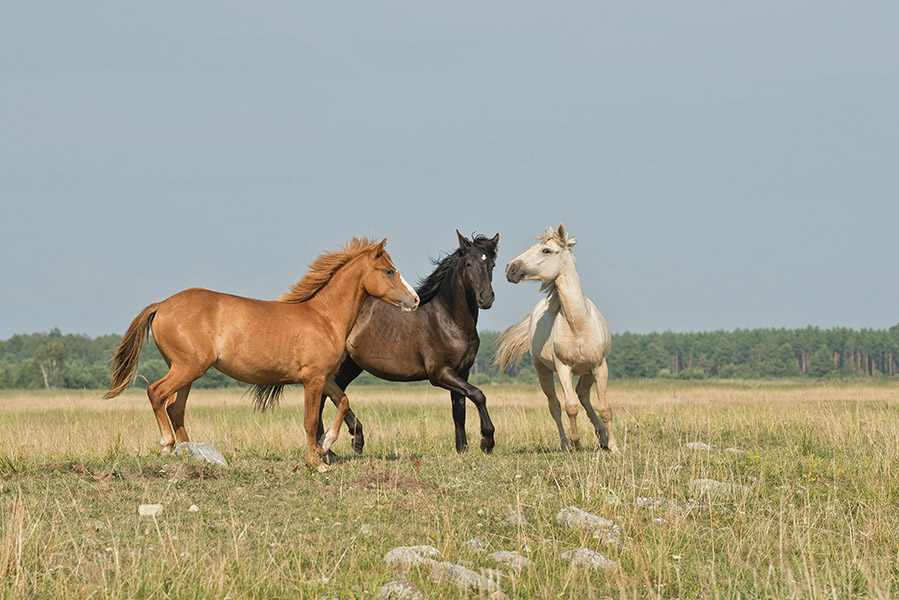




You die under the sky you loved, your dog Bismarck standing vigil beside you.
Scene 20, line 3, John Ware Reimagined
He stands on a porch with a neighbour, probably Frances Ings. It’s difficult to read Mrs. Ings’ expression; she looks into the sun, shades her eyes with her right hand. Uncharacteristically (it would seem) John scowls. Six dogs make the moment real, bring life to a long-ago day. Three run toward the photographer and although my ability to interpret pooch moods is limited, I say they are smiling. The smallest is next to Mrs. Ings, nonchalant about the concerns of the other beings. Two hounds are near John, close at hand, as though he said “stay,” and they stayed.
The tall one could be Bismarck.
For this to be true, it would mean Bismarck lived to an old age and was with the Wares at their first home near Millarville and still with them at Duchess, thirteen years later to stand near, for the end.

Mr. McLaughlin brought the harrows back. Papa harrowing this afternoon. Nancy, Mr. John Ware’s cow, had a calf at half past four this afternoon.
Diary of a young girl, April 5th, 1886
This is how I know people are lying when they say “everyone” called him the n-word. To the little girl from a nearby ranch, excited about the new calf, he was Mr. John Ware.

Do you know the names of all John Ware’s horses?
Little boy from the audience, Duchess, AB, September 28th, 2012
I drive to Duchess with Miranda and Janelle. We stop enroute at the hoodoos for selfies on the edge of a cliff. Dry, dry, dry. So windy.
People come from all around Newell County for our show. From Gem and Millicent and Duchess. Brooks of course. Some even drive in from Calgary. The Red Roof Studio is packed. We add extra chairs but late-comers still have to stand.
The evening unfurls and turns magical—what we live for as artists. Every moment. It is holy. During the Q&A, a young boy in the front row asks Jesse if he knows the names of all John Ware’s horses. For some reason Jesse lies and says yes, he does. I have no idea what Jesse’s plan is, but Janelle saves him from himself in a meta moment wherein everyone knows the show is over and they are Janelle and Jesse, the actors, not Mildred and John, the characters, but they
slip back into the mode of character. Janelle gently chastises Jesse for telling the boy a lie about knowing the names of John Ware’s horses. They engage in banter, as John and Mildred might have done. The little boy is pleased that his question has prompted such hilarity.
The banter buys me time, and when the question is inevitably put to me, I have made a mental list. I speak them to the little boy:
On May 22nd, 1883, a horse named Mustard jumped over a bluff into the Old Man River, with you on its back.
Scene 18, line 1, John Ware Reimagined
There are a lot of far-fetched stories about John Ware. As this one appears in a few separate sources from approximately the same time period, I put him in the probably true column. I allow Mustard to exist.
The horse he used at that time was called Harry. I saw him a good many times. John hurt his back… He was a lovely horse.
Joe Standish, ranch-hand, in a letter to his brother Chris, March 2nd 1961
I’m skeptical, not about the horse’s name, but about the allegation contradicting John Ware’s reputation as a loving steward of his animals. On the other hand, Standish seems to have been one of the more reliable narrators.
A big mouth from Ft. Macleod by the name of Fred Kanouse is cleaning up in the horse races, and John’s friends want to beat him. But the only horse with enough speed is a Wild Stallion.
Scene 17, line 7, John Ware Reimagined
I have reconciled myself to never knowing the name of this stallion. I picture him bucking and whipping from side to side, maybe even biting at the air in his rage before he settles under the hand of the legendary horse-whisperer. I picture John stroking his nose and giving him a name after they win the race to the cheers of his friends.
“Call ‘im Jack Rabbit or Hound Dog,” John replied, half in fun.
Grant MacEwan’s John Ware’s Cow Country, page 24
“Hound Dog.” Questionable because he comes from the unsubstantiated chapters of the book.
Stamina would count for much on a journey like this, and Molly was thought to possess it.
John Ware’s Cow Country, page 135
Similar note as above regarding Hound Dog. Unsubstantiated, although these later chapters contain many verifiable events. And Molly is a better name than Hound Dog. I hope Molly existed.
What is this? Sleet, rain? What is this? You’ll break Buster’s legs if you ride hard in this.
Scene 17, line 12, John Ware Reimagined
l have a memory failure. At the show in Duchess, I tell the little boy “Buster” from the play is a confirmed horse. But I can’t find the reference in my files now. Did I make Buster up? It’s okay if I did, it just matters for me to know if I did.
John and Bobby had gathered cattle (indecipherable) to dip in afternoon. Noon came, John told Bobby go get dinner…After Bobby had gone about 100 yards he heard [a] horse trotting behind. Flox/Flax(?) was following him. (Indecipherable)… and saw him lying on ground. He caught Flax/Flox & went back and his Dad was dead.
Ranchhand, from a letter to his brother, March 2nd 1961
In the copy of the actual letter, it’s hard to say if Standish has written Flox or Flax. The transcription says Flax, but perhaps the transcriptionist was making a guess. How unlucky for Floxie/Flaxie, to have been his favourite, gentle, everyday mare, to step in a badger hole and be the cause of his death, to be there with Bismarck to hear him take his last breath, to trot, riderless, the bearer of terrible news to young Bobby.

I stand in the wind at the edge of the cliff. I see them out there.
What did Bismarck make of that wind? Was he afraid of the flap and snap of sheets drying on the clothesline?
Bismarck rests in the shade of the house, protected. He spots Nettie and Bob racing their ponies, jumping the creek, hollering and carrying on.
He leaps to his feet.
Considers chasing after.
It’s hot and dry and windy out there, in contrast with this good spot.
By now he is old.
It’s enough just to bark.
I can see them out there.
Cheryl Foggo is a multiple award winning playwright, author, and filmmaker, whose work over the last 30 years has focused on the lives of Western Canadians of African descent. Recent works include the release of her NFB feature documentary John Ware Reclaimed, available on nfb.ca, as well as the 30th anniversary edition of her book Pourin’ Down Rain: A Black Woman Claims Her Place in the Canadian West. Recent journalism can be found on CBC Black on the Prairies and in Westword Magazine. In 2022 and 2023 her plays Heaven and John Ware Reclaimed will be seen in Ottawa at the National Arts Centre and at the Blyth Theatre Festival. She recently wrapped shooting of a short film about northern Saskatchewan’s Black History, scheduled to premiere in 2023. Cheryl is the recipient of the Lieutenant Governor of Alberta Outstanding Artist Award, The Doug and Lois Mitchell Outstanding Calgary Artist Award, and the Arts, Media and Entertainment Award from the Calgary Black Chambers, all in 2021. She is a 2022 inductee into the Alberta Order of Excellence.



You die under the sky you loved, your dog Bismarck standing vigil beside you.
Scene 20, line 3, John Ware Reimagined
He stands on a porch with a neighbour, probably Frances Ings. It’s difficult to read Mrs. Ings’ expression; she looks into the sun, shades her eyes with her right hand. Uncharacteristically (it would seem) John scowls. Six dogs make the moment real, bring life to a long-ago day. Three run toward the photographer and although my ability to interpret pooch moods is limited, I say they are smiling. The smallest is next to Mrs. Ings, nonchalant about the concerns of the other beings. Two hounds are near John, close at hand, as though he said “stay,” and they stayed.
The tall one could be Bismarck.
For this to be true, it would mean Bismarck lived to an old age and was with the Wares at their first home near Millarville and still with them at Duchess, thirteen years later to stand near, for the end.

Mr. McLaughlin brought the harrows back. Papa harrowing this afternoon. Nancy, Mr. John Ware’s cow, had a calf at half past four this afternoon.
Diary of a young girl, April 5th, 1886
This is how I know people are lying when they say “everyone” called him the n-word. To the little girl from a nearby ranch, excited about the new calf, he was Mr. John Ware.

Do you know the names of all John Ware’s horses?
Little boy from the audience, Duchess, AB, September 28th, 2012
I drive to Duchess with Miranda and Janelle. We stop enroute at the hoodoos for selfies on the edge of a cliff. Dry, dry, dry. So windy.
People come from all around Newell County for our show. From Gem and Millicent and Duchess. Brooks of course. Some even drive in from Calgary. The Red Roof Studio is packed. We add extra chairs but late-comers still have to stand.
The evening unfurls and turns magical—what we live for as artists. Every moment. It is holy. During the Q&A, a young boy in the front row asks Jesse if he knows the names of all John Ware’s horses. For some reason Jesse lies and says yes, he does. I have no idea what Jesse’s plan is, but Janelle saves him from himself in a meta moment wherein everyone knows the show is over and they are Janelle and Jesse, the actors, not Mildred and John, the characters, but they
slip back into the mode of character. Janelle gently chastises Jesse for telling the boy a lie about knowing the names of John Ware’s horses. They engage in banter, as John and Mildred might have done. The little boy is pleased that his question has prompted such hilarity.
The banter buys me time, and when the question is inevitably put to me, I have made a mental list. I speak them to the little boy:
On May 22nd, 1883, a horse named Mustard jumped over a bluff into the Old Man River, with you on its back.
Scene 18, line 1, John Ware Reimagined
There are a lot of far-fetched stories about John Ware. As this one appears in a few separate sources from approximately the same time period, I put him in the probably true column. I allow Mustard to exist.
The horse he used at that time was called Harry. I saw him a good many times. John hurt his back… He was a lovely horse.
Joe Standish, ranch-hand, in a letter to his brother Chris, March 2nd 1961
I’m skeptical, not about the horse’s name, but about the allegation contradicting John Ware’s reputation as a loving steward of his animals. On the other hand, Standish seems to have been one of the more reliable narrators.
A big mouth from Ft. Macleod by the name of Fred Kanouse is cleaning up in the horse races, and John’s friends want to beat him. But the only horse with enough speed is a Wild Stallion.
Scene 17, line 7, John Ware Reimagined
I have reconciled myself to never knowing the name of this stallion. I picture him bucking and whipping from side to side, maybe even biting at the air in his rage before he settles under the hand of the legendary horse-whisperer. I picture John stroking his nose and giving him a name after they win the race to the cheers of his friends.
“Call ‘im Jack Rabbit or Hound Dog,” John replied, half in fun.
Grant MacEwan’s John Ware’s Cow Country, page 24
“Hound Dog.” Questionable because he comes from the unsubstantiated chapters of the book.
Stamina would count for much on a journey like this, and Molly was thought to possess it.
John Ware’s Cow Country, page 135
Similar note as above regarding Hound Dog. Unsubstantiated, although these later chapters contain many verifiable events. And Molly is a better name than Hound Dog. I hope Molly existed.
What is this? Sleet, rain? What is this? You’ll break Buster’s legs if you ride hard in this.
Scene 17, line 12, John Ware Reimagined
l have a memory failure. At the show in Duchess, I tell the little boy “Buster” from the play is a confirmed horse. But I can’t find the reference in my files now. Did I make Buster up? It’s okay if I did, it just matters for me to know if I did.
John and Bobby had gathered cattle (indecipherable) to dip in afternoon. Noon came, John told Bobby go get dinner…After Bobby had gone about 100 yards he heard [a] horse trotting behind. Flox/Flax(?) was following him. (Indecipherable)… and saw him lying on ground. He caught Flax/Flox & went back and his Dad was dead.
Ranchhand, from a letter to his brother, March 2nd 1961
In the copy of the actual letter, it’s hard to say if Standish has written Flox or Flax. The transcription says Flax, but perhaps the transcriptionist was making a guess. How unlucky for Floxie/Flaxie, to have been his favourite, gentle, everyday mare, to step in a badger hole and be the cause of his death, to be there with Bismarck to hear him take his last breath, to trot, riderless, the bearer of terrible news to young Bobby.

I stand in the wind at the edge of the cliff. I see them out there.
What did Bismarck make of that wind? Was he afraid of the flap and snap of sheets drying on the clothesline?
Bismarck rests in the shade of the house, protected. He spots Nettie and Bob racing their ponies, jumping the creek, hollering and carrying on.
He leaps to his feet.
Considers chasing after.
It’s hot and dry and windy out there, in contrast with this good spot.
By now he is old.
It’s enough just to bark.
I can see them out there.

Cheryl Foggo is a multiple award winning playwright, author, and filmmaker, whose work over the last 30 years has focused on the lives of Western Canadians of African descent. Recent works include the release of her NFB feature documentary John Ware Reclaimed, available on nfb.ca, as well as the 30th anniversary edition of her book Pourin’ Down Rain: A Black Woman Claims Her Place in the Canadian West. Recent journalism can be found on CBC Black on the Prairies and in Westword Magazine. In 2022 and 2023 her plays Heaven and John Ware Reclaimed will be seen in Ottawa at the National Arts Centre and at the Blyth Theatre Festival. She recently wrapped shooting of a short film about northern Saskatchewan’s Black History, scheduled to premiere in 2023. Cheryl is the recipient of the Lieutenant Governor of Alberta Outstanding Artist Award, The Doug and Lois Mitchell Outstanding Calgary Artist Award, and the Arts, Media and Entertainment Award from the Calgary Black Chambers, all in 2021. She is a 2022 inductee into the Alberta Order of Excellence.